
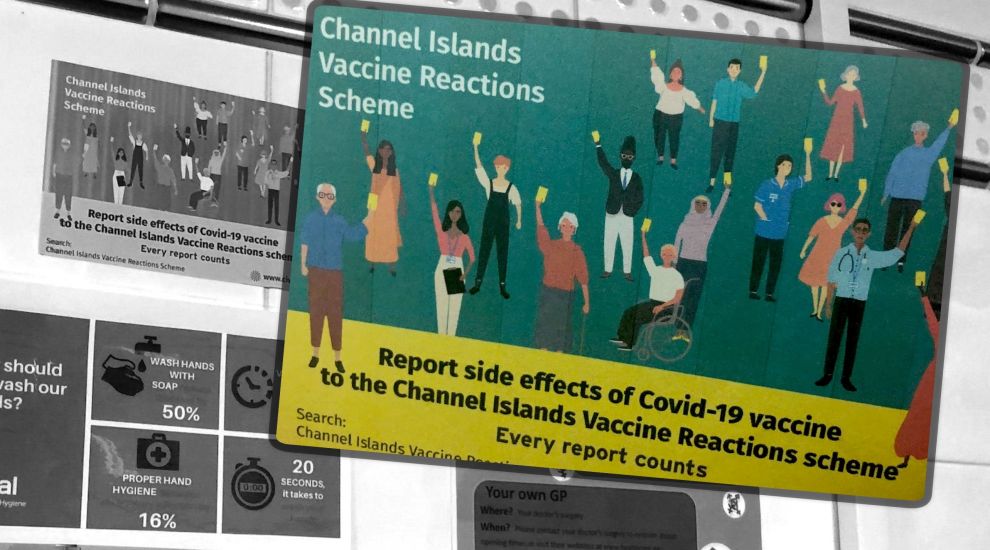

Islanders are being warned not to share their medical data with an anonymous group, who've imitated official public health branding to encourage people to share their vaccine experiences.
Posters for the ‘Channel Islands Vaccine Reactions Scheme’ (CIVRS) have been spreading across Jersey and Guernsey.
Appearing in public locations such as toilets, bus stops and the ports, often alongside official Government posters, and even published in local media, the posters informing islanders that “every report counts” are a near-exact copy of the MHRA’s Yellow Card Scheme branding.
The website advertised on the posters also mimics the Yellow Card site.
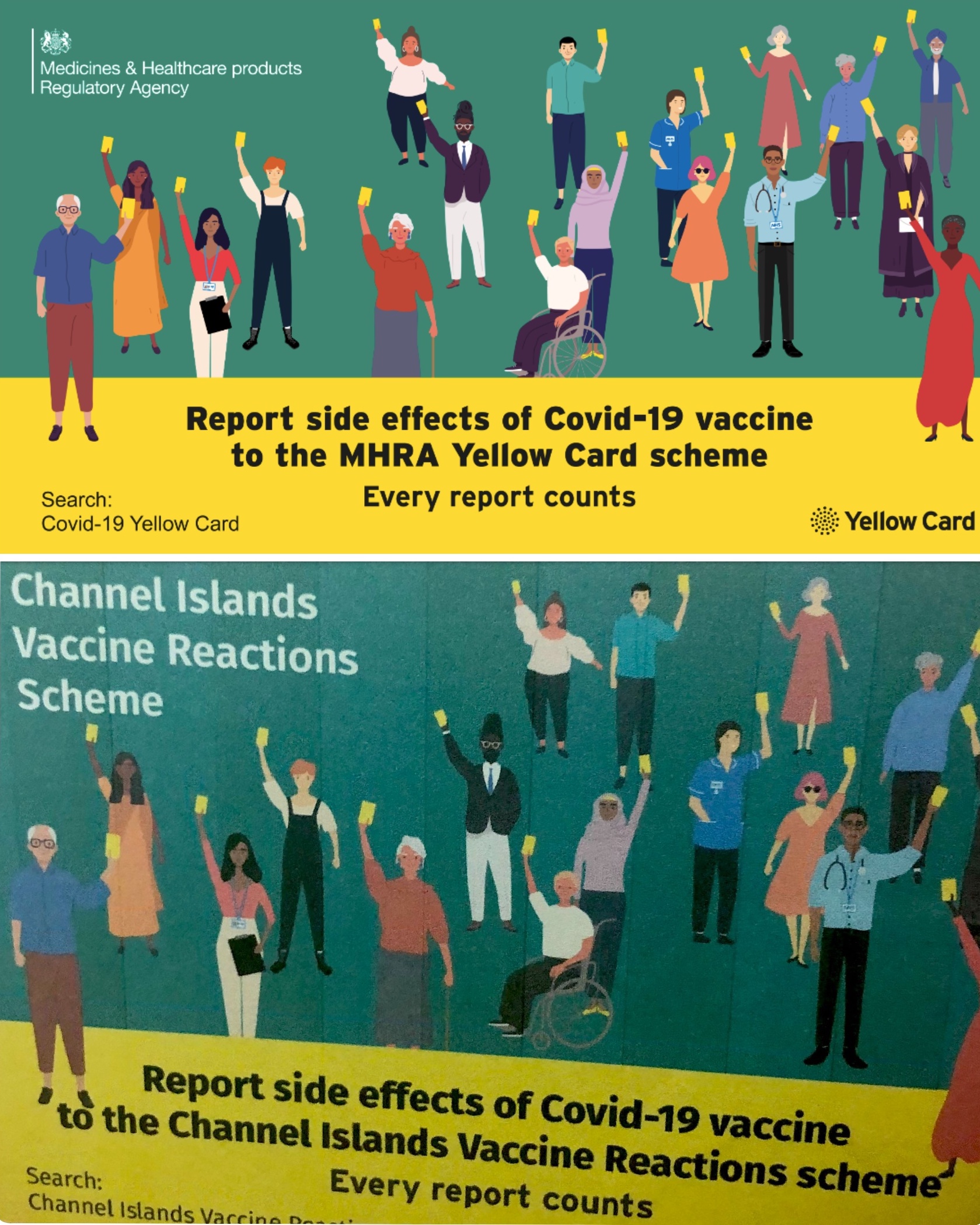
Pictured: Spot the difference... the official MHRA poster and a CIVRS poster in a St. Aubin toilet in Jersey.
But the CIVRS is not associated with the scheme - nor is it being endorsed by either Jersey or Guernsey’s Government, who are encouraging islanders to only use official reporting channels if they have an adverse reaction to the vaccine.
Express investigates ‘CIVRS’ and who is behind it…
The group describes itself as a “collective”, which “aims to raise questions” about the pandemic and “the legitimacy of the current emergency powers that have been granted that undermine our human rights, civil liberties and freedoms.”
Through an email exchange Express spoke to the as-yet unnamed organisers behind CIVRS, who simply refer to themselves as a community driven organisation.
“We aim to uncover and present data that is being censored and discredited in mainstream media and politics,” said a spokesperson.
“With the total lack of open scientific debate between our governments and the general public, including many credible medical and scientific professionals worldwide, it is imperative that we educate each other and look at the broader landscape of narratives with an open mind.”

Pictured: The group would not share their identities but described themselves as a "collective."
We asked CIVRS why it doesn’t guide people to the Yellow Card System, the official side-effect database launched by the UK’s Medicines and Healthcare products Regulatory Agency (MHRA).
“The UK Government took the position to explicitly remove any reports from the Channel Islands in their reporting,” claimed the spokesperson. “When referencing the Yellow Card data that was published by UK Column, the breakdown was always limited to England, Wales, Scotland and Northern Ireland. There was no mention of any reports received from the Channel Islands.”
CIVRS claims its data collecting service is more private than the Yellow Card System and more accessible.
“It is our belief a large number of people within the islands (especially the older generations) are not going to read through pages and pages of raw data. They want to be able to see trends and identify what risks, if any, they may face. Our hope is that presenting the data in an easy to read format, individuals can then have informed conversations with their individual healthcare providers/GP's should a suspected adverse reaction occur.”
There is still a question mark over why the group chooses to remain anonymous, despite Express asking for details about the organisers. And furthermore, why the group chose to copy Public Health branding.
CIVRS argues that there was “sparse mention of the Yellow Card system” by healthcare professionals, “therefore it was our intention to re-use design elements in line with what we believe the governments of Guernsey and Jersey would have used if they had put the service together themselves.”
Express asked who specifically was behind the initiative, suggesting that the group seems purposely opaque and noting that with anonymity comes a lack of accountability.
The group refuted this, saying: “...We clearly state our intentions and data processing on our website.
“Everything we do is in the open and we let our work speak for itself. We are not a government agency looking to hide and manipulate data to support a political cause.
“We are everyday people extending our arms with gratitude and love to our fellow islanders who we believe have been lied to.”
While it remains unclear who comprises CIVRS’ membership, Express understands that the group originated in Jersey.
Both Jersey and Guernsey are currently coming to the end of their Spring Booster covid-19 vaccination programme, with more than 70% take-up from eligible islanders in Jersey and more than 80% in Guernsey.
Jersey’s Deputy Medical Officer for Health, Dr Ivan Muscat MBE, said it remained “vital” that islanders report any side effects from the vaccine - but through the MHRA’s official and longstanding Yellow Card Scheme.
He said the Government was “aware” of the CIVRS website, but were not using or endorsing it.
“...[The Yellow Card Scheme] is the only credible and reliable system we have to make safe decisions about vaccines and medicines. I urge all islanders to do the same should they need to individually report vaccine or medicine related side effects either directly or through their GP.”
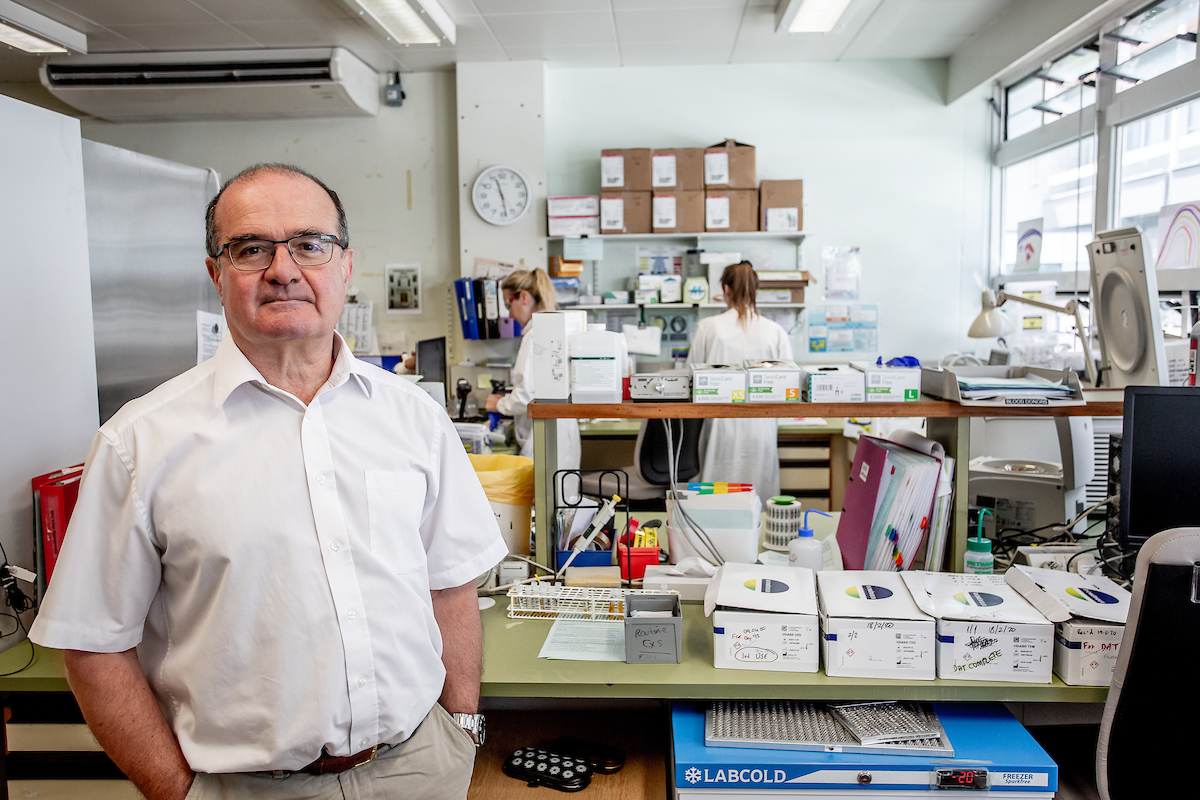
Pictured: Dr Ivan Muscat explained that having a separate Channel Islands scheme would not lead to "accurate or representative data."
Reporting side effects via this official route, he said, had been the process since the start of the covid vaccination programme - “and indeed with all medicines and vaccinations before the covid-19 vaccine”.
“The Yellow Card scheme has been run by the Medicines and Healthcare products Regulatory Authority (MHRA) since 1964. The scheme collects and monitors suspected safety concerns regarding healthcare products across the United Kingdom,” Dr Muscat explained.
While the CIVRS group said part of its rationale for creating the portal was to single out local data, which the Yellow Card Scheme doesn’t do, Dr Muscat warned that this “would not lead to accurate or representative data due to our very small numbers.”
This, he said, was why no Yellow Card scheme had been set up locally or across the Channel Islands.
“It is important that Islanders are not misled by unanalysed data or data based on such small figures,” he said.
In any case, he said that Jersey’s Public Health Intelligence Team already undertakes “observations and surveillance for a number of local covid-related reports, including our covid-19 rates and covid-related hospitalisations.”
Guernsey has responded similarly to the States of Jersey, by guiding people down official routes for reporting side-effects.
“We urge the community to use the official Yellow Card scheme to ensure any side effects are credibly reported and analysed. This is the appropriate and well-established route, rather than using unofficial channels purporting to collate data,” said a spokesperson for Public Health.
The CIVRS also raises questions of data protection.
While Jersey’s Information Commissioner, Paul Vane, said he could not comment on specific cases, he was clear that vaccine-related data is a “special category”, meaning it requires a “higher level of control and security”.
It must therefore be carefully handled in line with the Data Protection (Jersey) Law 2018, with the data handlers required to maintain “robust controls in place to protect the data collected.”
Mr Vane explained that as a regulator, his office had certain “expectations” of any individuals or groups seeking to collect such sensitive data.
“There are a few basic things we would look at:
Is the organisation registered with our office? All organisations collecting personal data are required by Law to be registered under the Data Protection Authority (Jersey) Law 2018, unless a specific exemption applies.
Do they have a fit-for-purpose privacy policy? The DPJL requires organisations to be open and transparent with their customers and provide them with certain explicit information set out in the Law. A good privacy policy is one way in which organisations can fulfil this obligation.
What security controls do they have in place to protect the data? Every organisation should have robust policies and procedures in place to ensure the data they hold is adequately protected. This includes (but is not limited to) setting out access permissions, managing internal and external threats, and should cover both physical and technical measures in place.
Be clear on the lawful basis for collecting and using the data. Many organisations fall foul of the Law by not understanding what lawful basis under the DPJL they are relying upon to collect the data. This is an essential part of compliance with the Law.
Data location - where is the data being stored? The DPJL restricts the transfers of personal data to third countries that cannot provide an adequate level of protection to the individuals who are the subject of the data, so it is important to understand where the data is stored, if off-island.”
The FAQ section of the CIVRS website says data is “protected” because “we de-couple any link between account information and the reaction itself”.
It adds that all data is “stored on servers in the European Union under our control” and that “sensitive data is encrypted before it is stored in the database and we hold the only decryption keys.”
The official route for reporting vaccine side effects is through the Coronavirus Yellow Card reporting site. The Yellow Card scheme allows members of the public to report suspected side effects - from various medicines and vaccines - to the Medicines and Healthcare products Regulatory Agency (MHRA). This process helps the MHRA build a database of reported side effects to ensure steps can be taken to develop safe and effective products.
The MHRA is continuously monitoring the safety of all covid vaccinations and has said that: “Vaccines are the most effective way to prevent infectious diseases and they save millions of lives worldwide.
“Like all medicines, vaccines can cause side effects. Most of these are mild and short-term, and not everyone gets them.”
The UK agency publishes regular reports on its findings and as of 25 May had received 171,109 Yellow Cards for Pfizer, 245,400 for AstraZeneca and 39,055 for Moderna.
The overwhelming majority of reports to the MHRA revolve around injection-site ‘soreness’ and temporary flu-like symptoms after the vaccination. Additionally, it says that “these types of reactions reflect the normal immune response triggered by the body to the vaccines”.
While it has received reports of 664 spontaneous adverse reactions associated with anaphylaxis, and 443 thromboembolic events (blood clots) - among thousands of other confirmed reactions - the reaction rate is one out of every 1,000 patients and the MHRA continues to conclude that covid vaccinations have saved tens of thousands of lives.
It urges everyone to get their vaccination when advised to do so and argues that the benefits of getting vaccinated, to the public and the individual, far outweigh the “currently known side effects”.
Following contact from Express, the unsolicited posters directing people to use the CIVRS have since been removed from Guernsey Airport.
The Chief Operating Officer of Guernsey Ports has emphasised that permission should always be sought first, before anything is put up.
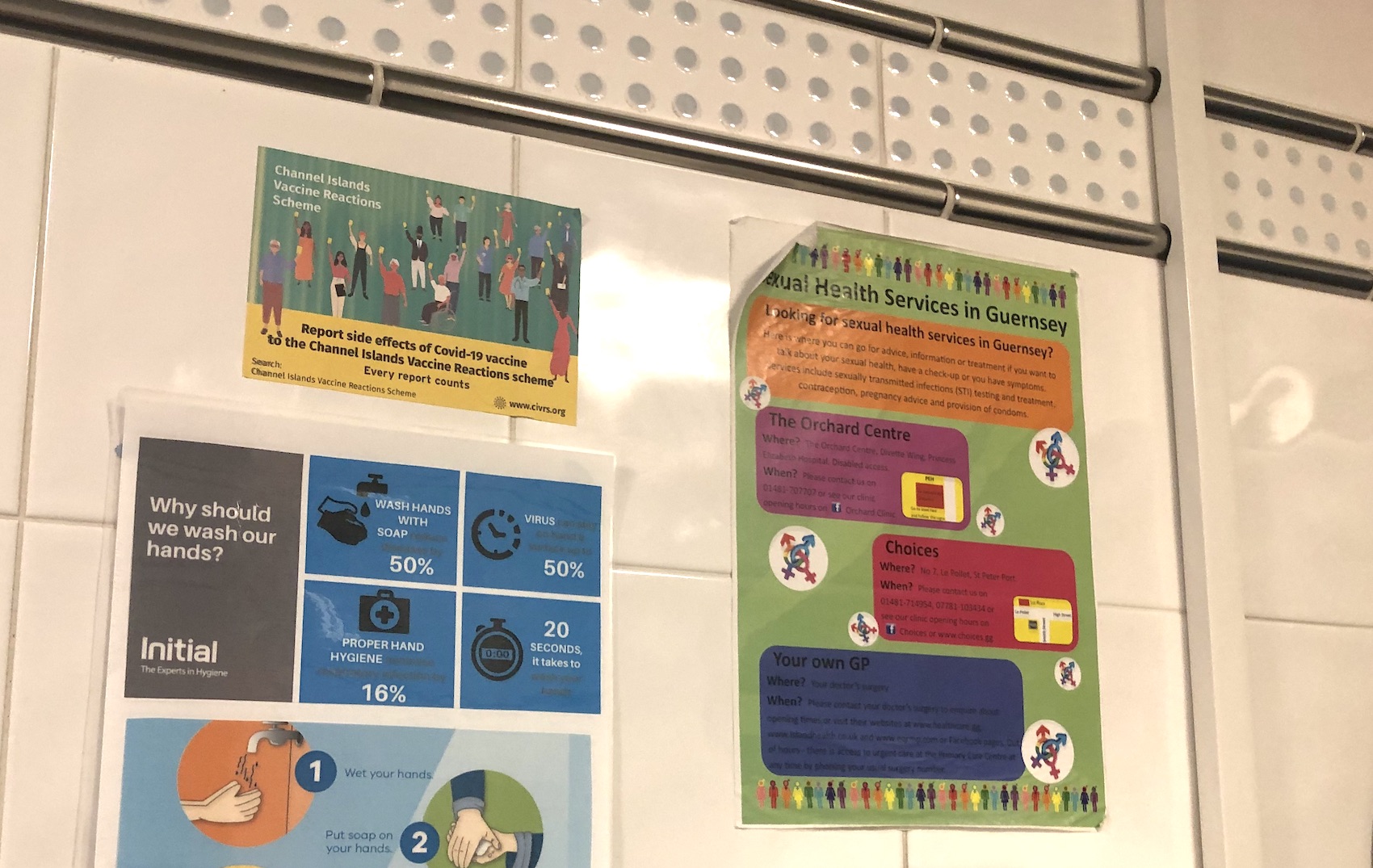
Pictured: A CIVRS poster spotted in Guernsey Airport on Monday.
“Posters are not permitted at Guernsey Airport or St Peter Port Harbour without prior approval, and any request will be considered on an individual basis,” said Ross Coppolo.
“As in this instance, any poster put up without approval will be removed.”
Jersey’s Government did not respond when asked by Express whether it would be taking any action regarding the posters that have been appearing in public locations and published in local media.
It’s not the first time both islands’ governments have had to react to misinformation and vaccine-sceptic movements.
In November 2020, Jersey’s Government launched a campaign against ‘fake news’, warning islanders to keep their guard up as fake accounts and covid conspiracy theories were circulating in local Facebook groups.
Less than a year later in August, a newspaper called ‘The Rock’ – a covid-sceptic “people-funded” local adaptation of the UK’s ‘The Light’ – was delivered to homes across the island.

Pictured: Extracts from ‘The Rock’, which described itself as a ‘truthpaper’.
Its content included articles questioning the pandemic, covid testing and vaccines, and decrying the alleged 'Nazification of the NHS'.
One by Dr Vernon Coleman, who Wikipedia describes as an "English conspiracy theorist, anti-vaccination activist [and] AIDS denialist", said readers would "have to be mentally deficient in some way - perhaps through wearing a mask for too long and suffering the inevitable dementia - to believe that we are in the middle of a pandemic."
He also said that “the disease known as covid-19 was never anything more than a means to an end; a training programme” and that “the plan is for mandatory vaccinations for all” – something Jersey’s Government has never advocated.
The Rock also included adverts for “radiation harmonising pendants” to protect mobile phone users and “counter-mainstream narrative coffee mugs” including slogans such as, “DON’T VAX THE KIDS".
Another item in the paper decried “local adverse reactions from the jab being swollowed [sic] up by the UK yellow card system” and the lack of “seperate [sic] data”.
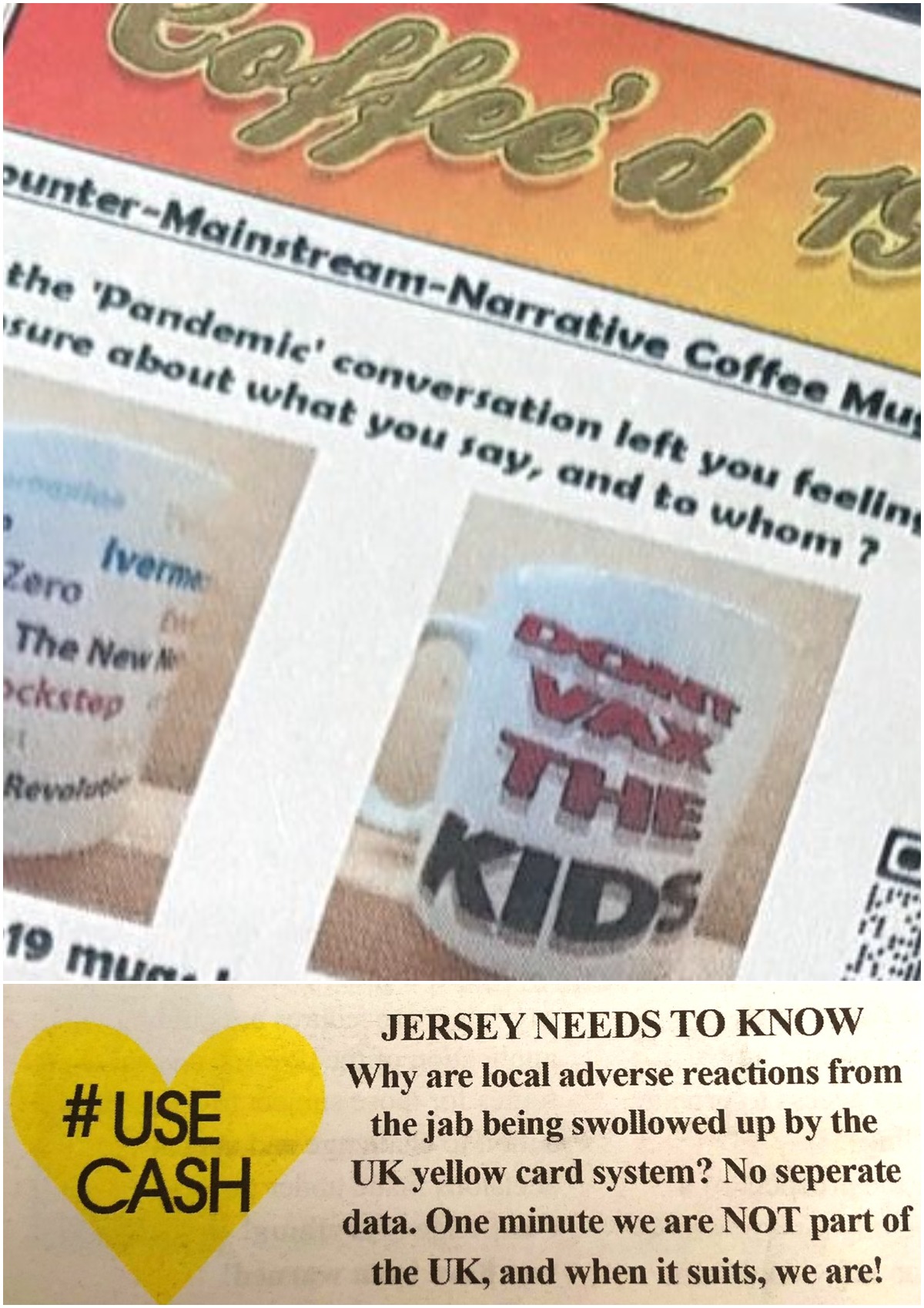
Pictured: One of the adverts in The Rock lamented the lack of separate data on vaccine reactions under the Yellow Card Scheme.
Jersey Post ended up pulling the newspaper from circulation, and the Government launched an investigation, after scores of islanders complained.
In Guernsey, three events were held to promote an “alternative take” on what organisers considered to be the mainstream response to the pandemic.
Each Covid Conversations event was attended by hundreds of people and the final event included a talk from one of the Medical Specialist Group’s Cardiologists, Dr Dean Patterson, who criticised the island’s vaccination effort.

Pictured: “I watch a lot of sport. The amount of sports people I’ve seen collapsing, struggling to breathe… I’ve never once seen players coming off the field with heart problems [in my career],” said Matt Le Tissier at one of the 'Covid Conversations' events.
He cited a “ten-fold” increase he had seen in myocarditis following the vaccination effort and presented an interview with a 20-year-old who had been hospitalised in Guernsey after being vaccinated.
He was joined by Guernsey footballer and well-known covid vaccine sceptic Matt Le Tissier, who spoke at length about sports people collapsing from heart conditions.
The States of Guernsey distanced itself from the events and urged the public to follow guidance published through official channels.
Islanders can directly report adverse vaccine reactions via the Official MHRA side effect and adverse incident reporting site for coronavirus treatments and vaccines.
Q&A: How are vaccination side effects being tracked?
Jersey’s Government goes into battle against ‘fake news’
Jersey Gov probe as covid-sceptic newspaper pulled from circulation
Comments
Comments on this story express the views of the commentator only, not Bailiwick Publishing. We are unable to guarantee the accuracy of any of those comments.